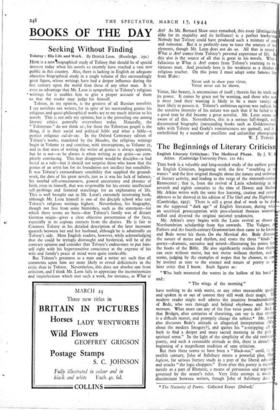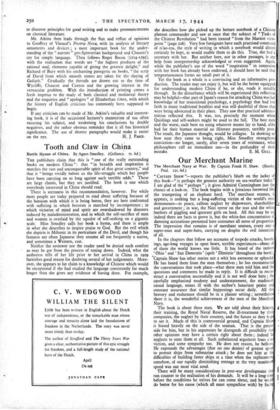The Beginnings of Literary Criticis
English Literary Criticism : . The Medieval Phase. By J. W. Atkins. (Cambridge University Press. 12s. 6d.)
Tins book is a valuable and long-needed study of the earliest pen in English Criticism, beginning with the first " troubling of t waters " and the first original thought about the nature and techniq of literary activity, and leading to the verge of the sixteenth-centu Renascence ; that is, from the revival of Latin scholarship in t seventh and eighth centuries to the time of Hawes and Skelto Mr. Atkins writes with the same fine learning, caution and reaso, ableness as he showed in his edition of The Owland the Nightinga (Cambridge, 19zz). There is still a great deal of work to be do on the supposed " dark age " of English literature, during whi an uncritical preoccupation with post-classical theories some% stifled and diverted the original national tendencies.
Mr. Atkins's story begins with the Latin revival as shown Northumbrian scholarship from 65o onwards. The Vulgate, Fathers and the fourth-century Grammarians then came to be knoss and Bede wrote his thesis On the Metrical Art. Bede discuss the nature of metre and rhythm, and states the three " kinds " poetry—dramatic, narrative and mixed—illustrating his points fr the books of the Bible. He also significantly realises that rhyth can exist without metre, but not metre without rhythm, and seems, judging by the examples of tropes that he chooses, to c by instinct as near to the essence and nature of poetry as 3 later critic that I know. Such figures as:
" Who hath measured the waters in the hollow of his hand " and : " The wings of the morning "
have nothing to do with metre, or any other measurable qual and spoken in or out of context they still work their magic. modern reader might well admire the intuitive broadmindedn of Bede, who sees through and behind rhythmus and beY0 metrum. What more can any of the free verse poets do? And that Bridges, after centuries of theorising, can -say is that rhyth is a difficult matter, and promptly change the subject.* Mr. Atki also discusses Bede's attitude to allegorical interpretation (Wh about the modern Imagery?), and quotes his "a-stripping off bark to find a deeper and more sacred meaning in the pith spiritual sense." In the light of the simplicity of the old vernac-ul poetry, and such a reasonable attitude as this, there is already beginning of a magnificent tradition of sane criticism.
But then there seems to have been a "black-out," until, in twelfth century, John of Salisbury enters a powerful plea, Me: logicon, for serious literary study as a part of the liberal ecincau and attacks " the logic choppers." Even after this poetry is regard merely as a part of Rhetoric, a means of persuasion and argurne governed by the orator's rules. Very little attempt is made discriminate between writers, though John of Salisbury does
* The Necessity of Poetry. Collected Essays (Oxford)?
to discover principles for good writing and to make pronouncements on classical literature.
Mr. Atkins then leads through the flux and reflux of opinions to Geoffrey of Vinsauf's Poetria Nova, with its analysis of literary ornaments and devices ; a most important book for the under- standing of the " aureate " pre-Spenserian background and Chaucer's cry for simple language. Then follows Roger Bacon (1214-1292), with the realisation that words are " the highest products of the rational soul, elements capable of giving the greatest delight," and Richard of Bury with his enchanting panegyric on books, " the scrip of David from which smooth stones are taken for the slaying of Goliath." Gradually the threads are drawn out to the time of Wycliffe, Chaucer and Caxton and the growing interest in the vernacular problem. With the introduction of printing comes a fresh impetus to the study of both classical and mediaeval theory and the enquiries and " apologies " of Elizabethan times, with which the history of English criticism has commonly been supposed to begin.
If any criticism can be made of Mr. Atkins's valuable and interest- ing book, it is of the occasional lecturer's mannerism of too often excusing his subject, and weakening his conclusions by double negatives, and the rather obvious reminder that it all has historical significance. The use of shorter paragraphs would make it easier



























 Previous page
Previous page